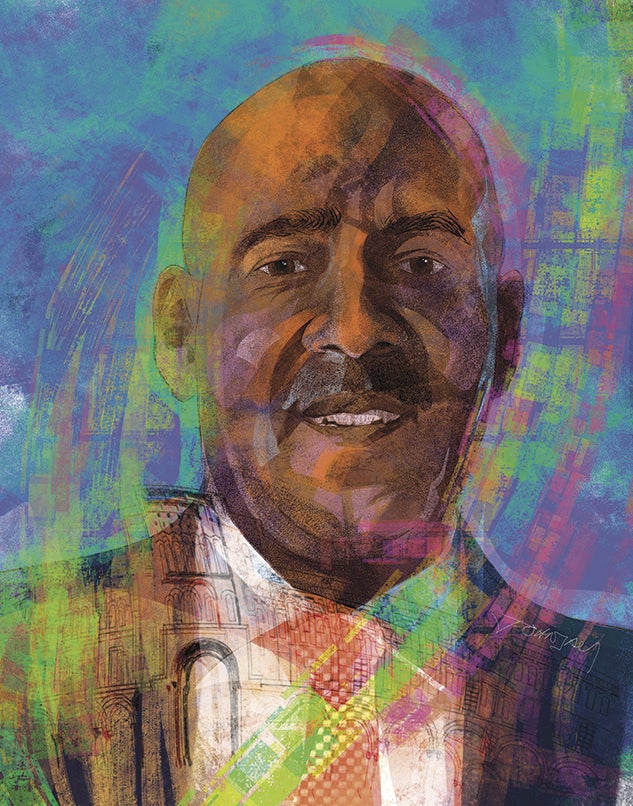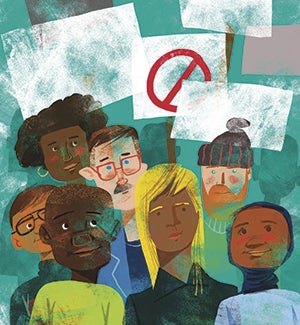Unconventional Wisdom: Reginald DesRoches
Provost Reginald DesRoches in his own words

From the start of his tenure as Rice University provost, Reginald DesRoches has been challenged in ways no higher education administrator could anticipate. Having accepted the job last December, the former dean of the George R. Brown School of Engineering and a structural engineer with expertise in earthquake-resistant structures knew the transition would be demanding. But who expected the level of disruption created by COVID-19? “It’s absolutely going to be a much more challenging role, not just for me, but for everybody at Rice, to be able to achieve our mission while making sure that health and safety is paramount in our minds,” he told Rice News in May, 2020. Having come through a summer of intense, ongoing planning for the fall semester and beyond, the same holds true as he works to keep Rice moving forward.
Pandemic Planning
COVID-19 is pretty much what we’ve spent our time on. As provost, I want to work on strategic issues and how we can improve our educational and research programs, and I haven’t had as much time to do that over the past few months. I hope that once we’re in a steadier state, I can focus on my broader role and think about the academic programs, where to make investments and how we can build excellence across the university. But COVID-19 has impacted all of our lives, so we really are laser-focused on getting back to our mission as safely and securely as possible.
Addressing Faculty Concerns about Safety
Obviously, there are some [faculty] who have concerns about direct student contact in the lab or classroom, and we’re allowing them the flexibility to teach remotely. About half of the faculty have chosen that option. And others can’t wait to get back in the classroom. Either way, as we found out in the spring when faculty rather successfully moved to online instruction on very short notice, I know the faculty are going to do a great job. There were challenges early on in terms of how we could return in a safe manner. I think we’ve handled that pretty well.
Shifting Lab Schedules
Some researchers, like computer scientists and mathematicians, have continued doing their work and weren’t as impacted as physical labs that had to be shut down. We’ve been phasing them back in, and I’m pleased to see how well it’s gone this summer. Instead of having everybody working from 8 a.m. to 4 p.m., we now have shifts and we’re getting work done. More pragmatically, we have to satisfy the contracts given to us by funding agencies. They gave us a break for a short period of time, but now we have to go back to it.
It’s great to see today’s youth with the passion and the energy and wanting to make a change. And I hope they do continue those conversations on campus, both within their own groups and with the administration. We’re very open to those conversations, and now we have a vice provost for diversity, equity and inclusion [Alexander Byrd ’90] who will work with members of our community to be more strategic and focused around building a more inclusive and equitable community at Rice.
Rice’s COVID-19 Research
Many [Rice research faculty] are doing extremely important work, some of it related to COVID-19, and some of that was funded internally by the Rice COVID-19 Research Fund. One is environmental engineer Lauren Stadler, who is looking at wastewater treatment plants all over the city because we know that the virus lives in our waste. She is working closely with the county health department to identify regional outbreaks of COVID-19.
There’s another cool project by the Shepherd School of Music and the Department of Electrical Engineering to see what social distancing should look like for people singing or playing horns, and they’re using advanced technology to see how far the virus could travel.
We also funded a joint project with bioengineer Rebecca Richards-Kortum and a colleague from MD Anderson, Kathleen Schmeler, to develop a low-cost, point-of-care diagnostic tool to detect the SARS-CoV-2 virus that causes COVID-19 in less than an hour. The team received additional funding from USAID to further develop this work and scale it to several countries in Africa, and Rice plans to deploy these tests on campus. Those are just a few projects that are underway.
The $100 Million Welch Institute Gift
The new Welch Institute for Advanced Materials is transformational for Rice and Houston. Technology drives so much in today’s society, and advanced materials drive so many technologies. It will allow us to bring the top talent across disciplines focused on materials to join our already outstanding cohort of faculty working in materials research.
Campuswide Role
I’m finding this position touches every part of campus. There’s really nothing I don’t deal with, even though my role is on the academic side. I’m realizing how important it is for me to be aware of what everybody’s doing, because it ultimately will impact our academic mission. That was sort of surprising, but it’s one of those jobs where everything that happens on campus impacts the academic part. So, I end up in a lot of meetings with many different segments of the campus community.

Racial Justice Issues
I was a student when the attack on Rodney King happened in 1991. It was one of the first times such a thing was caught on tape. That really opened my eyes as to living in this community and the risk that particularly Black and brown kids take. So [George Floyd’s killing] wasn’t as much of a surprise to me as it was perhaps for this young generation of students. The video of Floyd, coupled with the deaths of Ahmaud Arbery and Breonna Taylor before that, has had a huge impact on people all over the world, and certainly on me, personally. I think it caught the attention of many people who hadn’t previously thought about these issues, or weren’t aware these issues existed.
It’s great to see today’s youth with the passion and the energy and wanting to make a change. And I hope they do continue those conversations on campus, both within their own groups and with the administration. We’re very open to those conversations, and now we have a vice provost for diversity, equity and inclusion [Alexander Byrd ’90] who will work with members of our community to be more strategic and focused around building a more inclusive and equitable community at Rice.
— Kimberly Vetter
